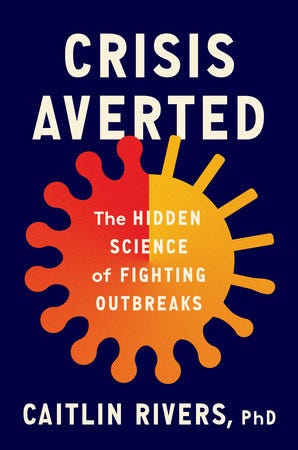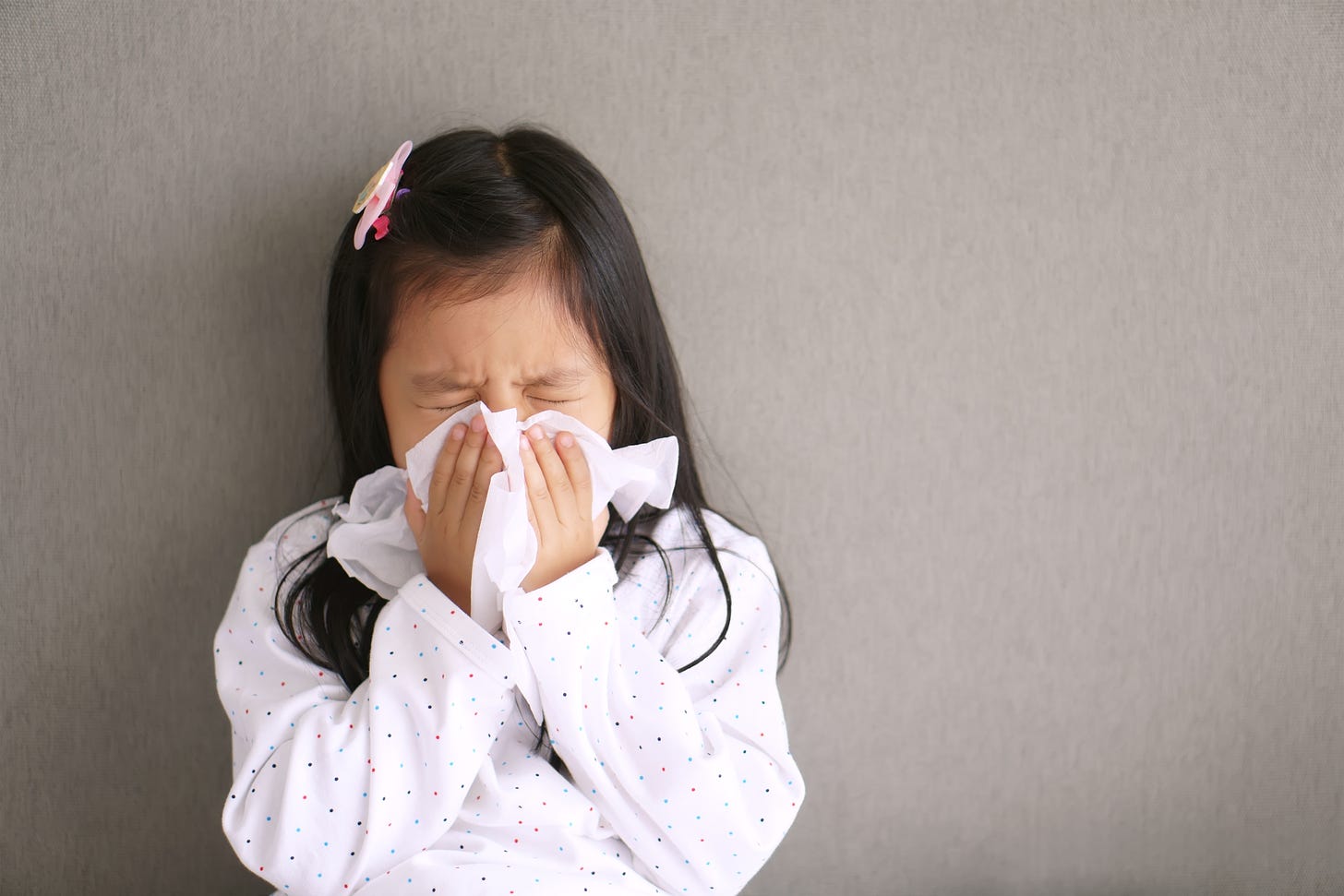Help, It's Peak Sick Kid Season
A Q&A with Dr. Caitlin Rivers about managing and preventing illnesses
Quick note: I decided to extend my TOTAL FALL CHAOS SALE through tonight at 11:59pm! Subscribe now to get 20% off my newsletter for a year!
Some of you may not know this about me, but in addition to writing about the science of parenting, I also write a lot about microbiology and infectious disease. So today I’m super excited to be running a Q&A with Johns Hopkins epidemiologist
. She writes the fantastic newsletter , which includes weekly updates of what’s going around, and she just published her first book, Crisis Averted: The Hidden Science of Fighting Outbreaks, which tells the fascinating (and harrowing) stories of some of the unsung heroes of epidemiology. If you’re a germ nerd like me, I highly recommend it!Today’s newsletter addresses key questions I have about managing and preventing kid illnesses this winter. I asked Dr. Rivers for her thoughts on the new CDC respiratory guidelines, whether we should keep testing for Covid, when to get a Covid booster and when to wait, how to handle playdates when your kid is sniffly, and more. She is is a mother of three young kids herself, and I very much appreciate that her perspective is rooted in the realities of everyday parenting.
Dr. Rivers, I'd love your thoughts on how parents should navigate the new CDC respiratory guidelines. My take is that in theory they are great, but that in reality many parents just do not have the resources to keep their kids home every time they have a new sniffle, sore throat or feel a little tired. How do you think parents should balance these guidelines with the reality of their busy lives? When should we be keeping our kids home?
There are two competing realities here. One is that missing school and work is disruptive, and it comes with its own risks. Parents can run out of PTO or lose income, and children miss lessons. On the flip side, if we were all more conservative about keeping sick kids home, we could probably reduce the overall levels of illness. I have three elementary age kids and my husband and I both work full time, so I get it. There are no easy answers.
Here is what the CDC recommends. Kids should stay home until they are fever free for 24 hours, and symptoms are improving. Then they can go back to school, but they should take steps like wearing a mask and avoiding crowd for the next five days. This is for any respiratory infection—Covid-19 used to have more strict recommendations than other bugs like influenza, but now they are all the same.
In our house, we do follow that guidance. One of my children had Covid-19 recently. I kept her home for several days until her cough subsided and her energy returned, then I asked her to wear a mask at school for the rest of the week. This is my approach for any illness that merits time off from school. If it’s just a stuffy nose, I still send them to school, but I encourage them to use hand sanitizer, and we talk about how wearing a mask when sick can keep others healthy. My littlest ones don’t mask reliably, so I err towards keeping them home an extra day compared to my oldest, who does keep her mask on.
What about playdates — should you cancel or reschedule them when kids have mild respiratory symptoms like a runny nose? Or let the other family know the situation and let them decide? Or.... not say anything since kids are constantly running around with runny noses anyway?
I prioritize courtesy by letting the other family know about the illness and ask them to decide if they still want to meet up. I will often suggest we keep our activities outside, too, to reduce the risk of transmission.
If my kids are sick, even if it’s just a runny nose, and they are scheduled to visit an indoor party or playground, I put my foot down. My kids give me a lot of grief for this, but I think the risk of transmission in those crowded indoor spaces is too high to justify.
What should parents do inside their home when one kid is sick but other members of the family are healthy? Do you recommend trying to isolate or mask sick children?
It’s so miserable when the whole household falls ill, so it’s worth trying to prevent transmission.
For mild respiratory infections, I keep the windows cracked if the weather allows, and I make sure the kids don’t share water bottles and things like that, but that is about it. I haven’t found it practical to do much more.
For more serious illness, like a fever, I isolate the kiddo and increase ventilation by cracking a window or using an air purifier. I don’t mask them at home, but I do if we visit the doctor.
With norovirus, which causes the stomach bug, I’m very aggressive. The sick person keeps to a dedicated bedroom and bathroom, and everyone else is kept away. I clean shared surfaces frequently with strong disinfectants (while wearing gloves), and do laundry on hot. Not taking any chances.
Stomach bugs are the worst. I do the same. Ok so what do you recommend now regarding Covid testing? Do you think people should test whenever they have cold or flu-like symptoms, even though guidelines don't change based on which respiratory infection a person might have?
I still test because I want to know! Maybe that’s the epidemiologist in me. But tests are expensive and it’s true that the guidance is now uniform across respiratory infections, so I don’t think it is essential. (FYI, each household can once again order four free tests from covidtests.gov.)
I do want to encourage people to be thoughtful when around older adults and people who are immunocompromised. Better safe than sorry.
Does it matter what kind of Covid booster a person gets? How long should you ideally wait after having had Covid before getting one, to maximize duration of protection?
I am not picky about which booster I get. You should wait at least 3 months after infection before getting boosted.
There has also been one recent update to the Covid-19 vaccine recommendations. Older adults or people who are immunocompromised can now get boosted every six months, which should help to extend protection through the summer wave.
Can you talk a bit about RSV and what parents of young children can do to keep their kids safe?
RSV (Respiratory Syncytial Virus) is a common respiratory virus, especially affecting young children. While it often causes mild cold-like symptoms, it can be more severe in infants, leading to bronchiolitis or pneumonia. Babies under six months are at higher risk for breathing difficulties, dehydration, and hospitalization due to RSV.
I recommend keeping infants away from crowds during the winter months. A big Thanksgiving gathering or holiday shopping at the mall is not a great idea with a newborn.
On the bright side, there are new options to reduce the risk of RSV. Pregnant women can get the Abryvso vaccine in the third trimester, which confers protection to the newborn. Alternatively, infants can receive a monoclonal antibody called nirsevimab. Both just came to market last year and are effective at preventing severe infection.








We have gone over to basically keeping air purifiers running on low all the time in our house, and turning them up if someone is sick.
I tested positive for COVID the night before I was scheduled to get my shot. My kids and husband didn’t get it, my husband had already gotten his flu and Covid shot 2 weeks before. I tested because I wanted to know but also because it was so similar to the last time I had it- felt like an allergy attack with very watery eyes and a lot of sneezing!
As far as isolating my kids from each other, we make them sleep in separate beds when sick because they normally share the bottom full bunk bed. But we don’t do much else except really warn them not to share food or water bottles. They’re strict about that at school so it carries over to home. I have made my oldest mask when he was sick but my 5 yo has never reliably been able to wear a mask for more than an hour so he stays home an extra day. We also tell people for any small illness, my sister in particular is very unbothered because she is exposed to a lot in her infant teaching job, but my immune compromised SIL is more likely to cancel meet ups especially if inside even with a cold.